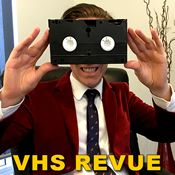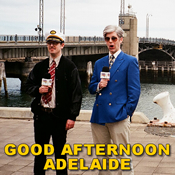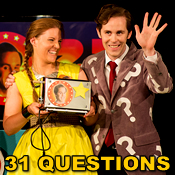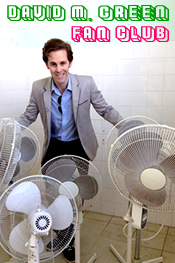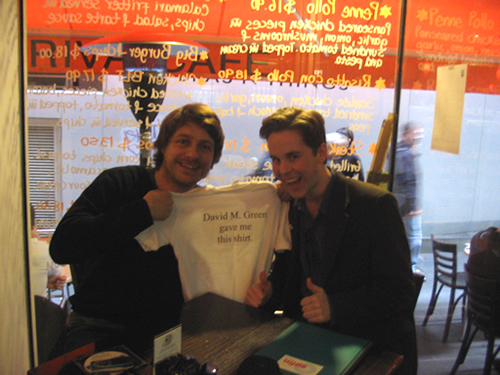
On the morning of Sunday 7 December 2008, I was sitting in my bedroom playing ‘Heroes of Might and Magic 2’ when Mum appeared at the door.
She had just read some bad news in the paper. “Richard Marslands has died,” she said.
Obviously, she must be mistaken. It’s ‘Marsland’ not ‘Marslands’ and besides, he’s only 32.
So I wandered upstairs where the Sunday Mail lay open on my parents’ bed.
Next to a large black and white photo of actress Kat Stewart with her AFI award was a smaller photo of a grinning, bearded Richard Marsland and the words “Leading radio star dies”.
This was clearly a prank. Wow, how’d he pull that off? It looked just like a real article.
That’s actually what I thought for a moment. Obviously that was denial – first of the five stages of grief. I was completely shocked and didn’t want to even consider the possibility it could be true. But of course, it was.
Richard Marsland had taken his own life.
Richard was an acquaintance. I’d like to say friend, but our friendship had barely begun. I’d never had a friend die before.
I’d known of him for a couple of years. In April 2006, Tony Martin and Ed Kavalee began what many believe to be the funniest and therefore greatest Australian radio show of all time, ‘Get This’ on the Triple M Network. Richard joined the show a few weeks later as the panel operator after it became apparent Ed had overstated his technical skills.
At the time I was 18 and had just joined up to Flinders University Student Radio, which broadcast Wednesday nights on community station Radio Adelaide. The consistently hilarious Get This was a huge influence in my early days mucking around on air.
In Australian radio comedy, basically there’s Tony Martin and then there’s everyone else.
But Get This was something else entirely. Tony, Ed and Rich with producer Nikki Hamilton-Cornwall and production wizard Matt Dower “on the pots and pans” gelled together in a way that made the show far more than the sum of its parts.
There was a spike in the ratings every time it aired anywhere and it had probably the most devout fan base of any radio show before or since. People loved them like their best mates.
When Richard started “on the buttons”, he rarely turned on his own mic to say anything. But a very gradual transformation took place over the weeks and months and eventually he elevated himself from silent operator to third host. Richard’s “white-anting” became a running gag.
I did a bit of white-anting myself and figured out having a community radio show was a great excuse to talk to my comedy heroes. I interviewed Tony Martin over the phone in September 2006 and when he dropped a reference to the Get This panel operator, I had to ask him to remind me what his name was.
It wasn’t until October 2007 shortly before Get This finished that Richard’s name was added to the show’s opening sweeper.
By the end of the show’s two years, he had appeared in or been the subject of countless brilliant and hilarious sketches. There was the mash-up of World’s Wildest Police Videos where Richard took a stolen ‘Black Thunder’ for a joy ride.
The many replays of his ad-lib rendition of the Vengaboys hit ‘We Like to Party’ with a few of the words from their other hit ‘We’re Going to Ibiza’.
And Tony’s parody of Bad Company’s ‘Feel Like Makin’ Love’ but with lyrics all about the white-anting Richard.
As I gradually discovered, there was a lot more to Marslando Calrissian.
He grew up in Adelaide’s northern suburbs and began working at SAFM in the mid 90s as a panel operator and Black Thunder driver.
It’s quite likely he handed me more than one icy cold can of coke back in the day. I listened to SAFM religiously and would often get the baby-sitter to drive me and my siblings all over town chasing free Kool Mints and movie tickets.
In the early 2000s, Richard joined Adelaide TV royalty Anne Wills as co-host of ‘AM Adelaide’ on Channel 7.
He was also a comedy writer and after moving to Melbourne, he wrote for some of the biggest shows of the era, including Rove Live, The Glass House and eventually for Shaun Micallef’s SBS comedy Newstopia.
Like many Get This fans, I was genuinely angry when the show was axed in November 2007. It was a particularly barren time for comedy on Australian radio and television – there were fewer online options back then – and this brilliant show that was also highly rating was getting the arse. It didn’t make sense.
By then I had finished studying and was keen on making the transition from community radio to the kind where they pay you. The late Adelaide radio legend David “Daisy” Day was helping me put a demo together.
We were talking in his office on South Terrace one afternoon and after listening to some of my sketches, he said I reminded him of Richard. They knew each other from the SAFM days. I was instantly intrigued and once again, used the community show as an excuse to contact him.
I still had Nikki’s number from interviewing Tony the previous year so I called her and she put me in touch with Richard. He was going to be in Adelaide for Christmas and was happy to come into the studio for an interview.
The interview was set for 29 December 2007. On the day however, Richard called to apologise, which was how most conversations with him would start.
He couldn’t make it to the studio and it’d have to be over the phone. I was disappointed I wasn’t going to get to meet him but it was better than nothing.
Back then, Radio Adelaide was at 228 North Terrace. The studios were built in the late 80s and by community radio standards, they were excellent. The phone system however was much older and to this day, it’s the only time I’ve ever seen a wood panelled telephone.
We chatted for about an hour about all sorts of things. How he got started in the biz, comedy idols, working on Get This, stories from the panel, writing for TV. It was great. Rich was a lovely guy.
 David M. Green interviews Richard Marsland, Radio Adelaide, 29 December 2007 [ 44:54 ] Hide Player | Play in Popup | Download
David M. Green interviews Richard Marsland, Radio Adelaide, 29 December 2007 [ 44:54 ] Hide Player | Play in Popup | DownloadIn January 2008, Richard moved to Triple M Melbourne breakfast as the panel operator for Peter Helliar and Myf Warhurst’s new show.
The same month I had a meeting with SAFM program director Craig Bruce. He gave me my first paid radio job as a casual panel operator. Just like Richard a decade earlier.
I panelled the evening shows that were networked from Sydney and Melbourne, mainly The Hot 30. Occasionally Hamish & Andy.
Even though those shows were made interstate, Adelaide still needed someone at the panel to record local traffic updates and be ready with some music just in case the feed dropped out.
Often I’d be the only person in the old Austereo building on Greenhill Road. It was a big two storey building made of dark brown bricks, clearly designed for a much larger staff. A lot of it was empty now. It smelt like a holiday house.
I liked wandering around and looking at all the weird pop culture memorabilia they’d accumulated since launching in 1980 as Adelaide’s first FM station.
The walls were covered with framed CDs commemorating a sales milestone of some significance and the odd photo of a celebrity. The most prominent item on display was an autographed pair of Mick Molloy’s underpants.
Down one of the corridors, stacked on the floor against a wall were several plaques that honoured past employees of the month circa 1998. Richard Marsland’s name was on three of them. Awesome.
In July 2008 I went to Melbourne for a few days with my then girlfriend Jemima. I emailed Richard and asked if he wanted to get lunch while I was in town. He said sure and we met in front of Myer in Bourke Street Mall.
The first thing he did after we shook hands was apologise for not shaving.
We found a café down a side street, grabbed a table and talked non-stop for more than 2 hours in minute detail about radio, TV, comedy, writing, panelling and Get This. Jemima understandably got bored about half way through and left us nerds to continue on our own.
Richard told me how he made his famous Warwick Capper soundboard prank calls in 2001 using actual tape cartridges. Hearing those re-aired on Get This inspired me to make some myself using clips of Dutch-American MMA fighter Bas Rutten. I did it with software though. Much easier.
I gave him a white T-shirt with iron-on text that read: “David M. Green gave me this shirt.”
He was extremely generous with his time. He even read a couple of scripts I brought along and gave me some pointers. He paid for lunch too. And he left a nice tip.
Boy I really wish I recorded that conversation. I’ve forgotten most of it now. But a couple of bits of advice stuck with me.
He said if you’ve got an idea but you’re having trouble pitching it to the powers at be, sometimes it’s easier to just make it yourself anyway and show them the finished product so they don’t have to use their imagination. That’s easier to do with a radio sketch than a feature film, but still good advice.
And with regard to following in his footsteps and forging a career as a panel operator and comedian, he said “just enjoy it”.
We walked back out onto Bourke Street and parted ways near the statues of three thin people. We shook hands three times while exchanging drawn out goodbyes. I had a flight to catch. Richard had to get home and write a sketch about Guitar Hero.
That was the one and only time I saw him in person.
A couple of weeks later, I lost my job at SAFM. They replaced the evening panel operators with automation. This was during the period after they’d scrapped the Black Thunders but before they brought them back so there weren’t any other entry level positions for me.
At the time I was also making sketches for ABC Radio, but thanks to a falling out with a friend, that quickly fell through as well and I was back to square one. I really felt like the rug had been pulled from under me. It was one of the lowest points of my life. In retrospect, I think of it as my quarter life crisis.
I emailed Richard and told him all about it. He sent a really nice reply.
“I’m of the opinion that you haven’t really had a career in the Australian media if you haven’t been sacked due to no fault of your own,” he wrote.
“Look at the long list of talents who have been told to hit the bricks – from Tony to Shaun to Judith to Mick: it’s insane and it makes no sense BUT it does happen and the best thing to do is take it on the chin and keep coming at them.”
“It’s a funny industry full of revolving doors, so eventually one will open for you, I guarantee it. You just have to keep positive, and stay persistent. Luck is hard work meeting opportunity.”
“So – don’t let it get you down too much, okay? I won’t lie – I know it sucks, but everything will be DMG before you know it. You just have to get ready.”
“Speak soon, give me a call anytime! Richard.”
Soon after that I decided I was going to move to Melbourne.
Three and a half months later, Richard was gone. Even some of the people closest to him had no idea he suffered from depression.
His funeral was held at St Ignatius Church in Norwood. It was the first time I’d been to a funeral for someone under the age of about 70 and it was packed.
A station wagon was parked outside with two people in T-shirts reading “Generic Radio Station” giving out pretty warm icy cold cans of coke and Farmer’s Union Iced Coffee.
For the previous two weeks I felt shock more than anything. I felt like crying but I didn’t. Then they played ‘The Rainbow Connection’ from The Muppet Movie and I saw Richard’s coffin being carried into the church with Tony as one of the pallbearers. That did it.
There was laughter too of course. Hearing Richard’s youthful escapades with friends and the pranks he used to pull on his sisters, I couldn’t help but smile.
Tony Martin delivered a warm tribute. He leaned into the mic and opened with the words: “Normally this is where Richard would be checking the levels”.
“Richard was on the verge of moving into an area where few people in comedy can move; a kind of comedy where he presented a version of himself which was very vulnerable and very real,” he said.
“He was a man who was really serious about his work; we have lost that someone on radio, a beautiful person that everyone loved.”
During the eulogy, I also learned Richard’s first job was a pizza delivery driver. The following week, I saw Brighton Pizza Haven was looking for drivers, so I applied and became one myself.
I received several emails from Richard’s friends, family, former co-workers and fans – some now living on the other side of the world – who had discovered the phone interview. All of them had their own stories about Richard’s warmth and generosity.
About six months later, my Radio Adelaide friends and I entered a competition called Semi-Pro Radio. We made the final selection and got to make a one off show on the Triple M network.
We pre-recorded it at Triple M Adelaide – which was downstairs from SAFM – and managed to sneak upstairs to check out the ‘Richard Marsland Room’ they’d built up there.
It was more of a nook, but there was a large mural on the wall with a stream of consciousness in scrawling text with references to iced coffee and the word ‘sorry’ about five times in a row. Unmistakably Richard.
Nothing came of that contest, but I made the move to Melbourne and kept doing community radio and community television too.
In 2011, I got my second job in radio as a panel operator at Melbourne’s new AM talk station MTR.
I signed the lease on my first apartment on 29 February 2012 so I could live closer to the studios. Two days later the station went into administration and everyone was sacked.
Again, Richard’s words of encouragement in that final email helped me through the tough time. As he said, it happens.
Just a few months later I got another radio job at Crocmedia and in a weird call back to Get This, ended up spending five years panelling AFL broadcasts with Rex Hunt. “How good is this?”
In 2014 I landed my dream job as a comedy writer for ‘Shaun Micallef’s Mad as Hell’ on ABC TV. I’ve now been there for seven seasons. Coincidentally, Nikki Hamilton-Cornwall is the locations and casting producer. Everyone I’ve met who worked with Richard remembers him fondly.
I think about Richard a lot. Especially around this time of year.
There have been many times over the last decade where I would have loved to get his take on some of the more advanced aspects of panelling or writing as I’ve encountered them.
And I wonder what he would be doing now. All the gags he didn’t get to write and the laughs he never heard. I don’t think he ever really knew how much people loved him.
Radio comedy combines the most intimate genre on the most intimate medium.
When I’m back in Adelaide driving around, random bits of Get This pop into my head. It happens subconsciously when I just happen to be where I was when I heard them the first time and I remember how much I laughed.
Richard’s legacy lives on. ‘Capril’ started as a joke on Get This. It now takes places every April with people wearing capes during everyday activities to promote awareness of mental health and raise money for beyondblue.
The hashtag #ImRichard routinely trends on Twitter with fans tweeting various obscure Get This references. It’s like the show never ended.
In fact, you can find all the episodes online with the music and ads cut out. If I had to choose only one radio show to listen to for the rest of my life, that’d be the one.
Others knew him much better than I did. But for me, Richard was a mentor and inspiration.
He made me laugh. He showed me someone from Adelaide can achieve great things in the entertainment industry. He helped lift me out of one of the lowest points in my life.
Even 10 years on, he’s still with me and everyone he touched because in true Richard Marsland style, he’s white-anted into our lives.
– DMG


